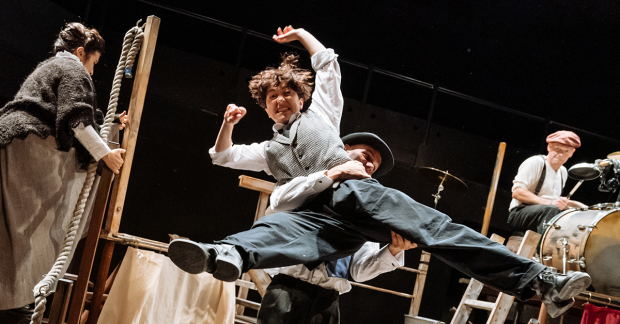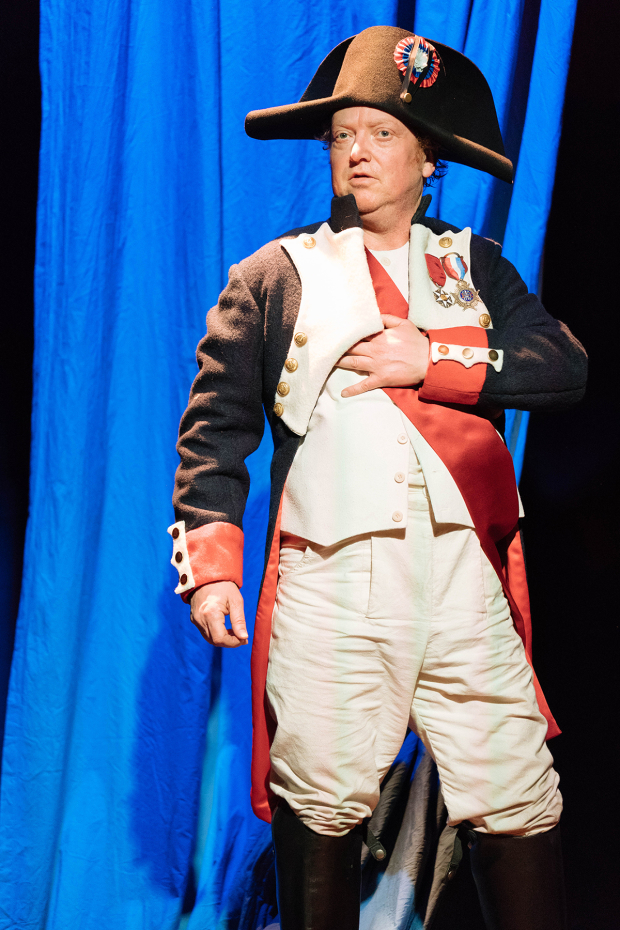Review: The Strange Tale of Charlie Chaplin and Stan Laurel (Wilton's Music Hall)

© Manuel Harlan
"We make no attempt to put reality on stage," declare Told by an Idiot, the company behind this anarchic gem.
It's a promise that has defined their back catalogue – pieces concocted collaboratively from a single, often unlikely, idea and performed seemingly spontaneously. Inventive, highly physical, carefully crafted chaos.
And things are no different here. Based on one truth – that in 1910, an unknown Charlie Chaplin and Stan Laurel sailed to New York together as part of Fred Karno's famous music hall troupe – the rest is imagination in overdrive. Both in plot, and performance.
Through a series of chronologically askew scenes, we explore the pair's relationship, as well as other key moments that shaped them as individuals. And, aside from the odd song, it's all done through mime.
If you're starting to panic, don't: it's astoundingly clear. Not to mention hilarious.
The cast of four are masters of their own physicality – creating backstory, winning laughs, and pinpointing the strongest of emotions with the smallest of gestures. Or with a mere flicker of a facial expression; Amalia Vitale's Chaplin repeatedly brings the house down with her pointed glances to the audience. She also nails his signature waddle, and Jerone Marsh-Reidnail responds with Laurel's doe-eyed blinks. Hugely mismatched in stature, they also make for the perfect slapstick duo.
They're supported by two equally adept performers. The protean Nick Haverson, who shapeshifts effortlessly between bombastic Fred Karno, Chaplin's drunk dad, a brilliant Oliver Hardy and more. And Sara Alexander, who delivers comedy and poignancy in equal measure as Chaplin's doting mother – one moment a coquettish wannabe performer, the next the straight-jacketed charge of the doctor. She also plays the show's original piano score, written by Mercury Music Prize nominee Zoe Rahman. Punctuating every tumble, tussle and wink, it proves an essential partner to the action.
Ioana Curelea's set looks simple. An ascending series of platforms, with a mini-stage-cum-sleeping-cabin onto whose red velvet curtain essential information or dialogue is projected. But don't be deceived. Artfully conceived to aid every slapstick stunt (look out for the hidden trampoline), this is a mime artist's dream playground.
And play they do. Running raggedly around a spinning table top to conjure an exhausting spiral staircase; moving through a labyrinth of hotel lifts using only the ding of a bell; re-enacting Chaplin's birth with, well, I'll leave that one as a surprise.
And best of all, they're not afraid to show us behind the curtain. The carefully lit candles that are subsequently ‘blown out' by pressing a button on the flame. The fish glued to the frying pan. The egg that bounces.
Timelines are no match for these four either. In one section, we ricochet between the ship, where tiny Chaplin is manoeuvring Laurel's enormous unconscious frame into a suitcase, and the 1970s, where a Savoy guest is delighted to be staying in Chaplin's favourite room. At the end of each scene, actors and props are left in new and challenging places, ready for the other timeline to deal with. It is silliness at its most complex and delightful.
Then, just when you think things can't get any more mad, there's the hip-hop segment. And if that's not enough to tempt you to this riotous masterclass in storytelling, then I don't know what will.












